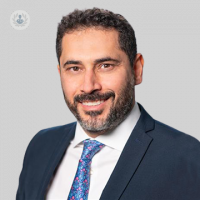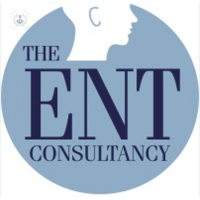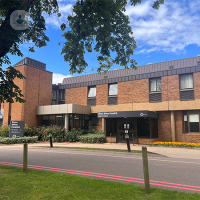Thyroid cancer
Professor Chris Nutting - Clinical oncology
Created on: 11-13-2012
Updated on: 07-24-2023
Edited by: Sophie Kennedy
What is thyroid cancer?
Thyroid cancer is a type of cancer which affects the thyroid gland, which releases thyroid hormones that help control the body’s metabolism. Thyroid cancer is relatively rare, and in most cases it is treatable. Thyroid cancer most commonly affects women between the ages of twenty and forty, but can occur at older ages. Thyroid cancer is also more commonly found in women than in men.

What are the different types of thyroid cancer?
There are four principal types of thyroid cancer which are more prevalent in different groups of people. Some types of thyroid cancer are easier to treat than others.
Papillary carcinoma is the most common type of thyroid cancer, making up around eighty per cent of cases. It most often affects women and those under the age of forty.
Follicular carcinoma accounts for around ten per cent of thyroid cancer cases and usually affects middle aged people, particularly women. Papillary and follicular carcinoma are the most common forms of thyroid cancer and their treatment tends to be easier. They are also sometimes referred to as differentiated thyroid cancers.
Medullary thyroid carcinoma is a much rarer form of the disease, making up less than ten per cent of cases. It is the only form of thyroid cancer which can run in families.
Anaplastic thyroid carcinoma is the rarest form of thyroid cancer, accounting for only around two per cent of cases. This is the most serious form of thyroid cancer and most often affects people over the age of sixty.
What are the symptoms of thyroid cancer?
Thyroid cancer symptoms include:
- A painless lump in the front of the neck
- Swollen glands in the neck
- In rare cases, a sore throat that doesn't go away over time
- Rarely, trouble swallowing or hoarseness which occurs for no reason and persists over time
- Difficulty breathing
Neck lumps are usually not cancerous, and they are often caused by less serious conditions such as an enlarged thyroid gland. However, if you have a lump in your neck, it’s important to have it checked, to be sure.
What risk factors make a person more likely to develop thyroid cancer?
The cause of thyroid cancer is largely unknown, but there are certain factors which increase the risk of developing thyroid cancer. Those with a family history of thyroid cancer are at a higher risk, but it is important to remember that thyroid cancer is still rare, even if a family member has it.
Exposure to radiation can be a risk factor for thyroid cancer, with it being more common in those who have undergone radiotherapy treatment, particularly during childhood. The risk of thyroid cancer is not generally higher in those who are regularly exposed to radiation through work, though in those who have survived atomic accidents or explosions, the risk is higher and thyroid cancer is more common.
Thyroid cancer is also more common in those who are overweight, have diabetes, and those who have had cancer before.
Can thyroid cancer be prevented?
Most cases of thyroid cancer are not preventable. However, as radiation is a known risk factor, medically it is not used in the treatment of less serious diseases. X-rays and imaging scans also increase exposure to radiation, so these types of test are only administered when absolutely necessary.
How is thyroid cancer diagnosed?
After conducting a physical examination, your doctor will conduct a blood test to assess how the thyroid is functioning. Abnormal levels of thyroid hormones in the blood can indicate that the thyroid is either overactive (hyperthyroidism) or underactive (hypothyroidism).
If the hormone levels show as normal, further testing will be necessary to determine the cause of your symptoms. such as an ultrasound scan which can create an image of the area.
A biopsy is necessary to establish if a lump in the thyroid area is cancerous. This is performed by inserting a thin needle into the lump so that some of the tissue can be extracted and examined under a microscope. If cancer is found in the thyroid, further testing will be needed to determine whether the cancer has spread to other areas of the body. A CT or MRI scan may be performed to assess this.
What are the different stages of thyroid cancer?
Determining the stage of development of thyroid cancer allows doctors to decide on the best course of treatment. To describe the stage of thyroid cancer present in a patient, doctors use a system known as the TNM system, which stands for tumour, node and metastases.
- T refers to tumour, which is graded from one to four, depending on the size.
- N refers to nodes, which indicates whether the cancer has spread to the lymph glands (which are located close by) with zero or one.
- M refers to metastases, which represents whether the cancer has spread to another part of the body with zero or one.

How is thyroid cancer treated?
Treatment for thyroid cancer depends on how far along the cancer is (i.e if it has spread) and what type of cancer it is. There are various approaches to treatment including surgery, radioiodine and external radiotherapy. Chemotherapy is rarely used in thyroid cancer, but targeted therapy is sometimes used.
During the surgical procedure used to treat thyroid cancer, which is known as thyroidectomy, all or part of the thyroid is removed as well as the nearby lymph glands in some cases. Following thyroid removal surgery, it is necessary to take some hormone replacement tablets and in some cases, some calcium supplements as the body cannot function as it formerly did without the thyroid.
Is treatment for thyroid cancer usually successful?
After treatment is administered, and the cancer is removed, it is important to have further check-ups to make sure the cancer does not return. This may be assessed through blood tests which can detect the presence of substances released by cancerous thyroid cells or through ultrasound or radioisotope scans. The success rates for treatment of thyroid cancer are very good and should the disease recur, further treatment options are available.
What type of doctor treats thyroid cancer?
Specialist endocrinologists and oncologists treat thyroid cancer.
















